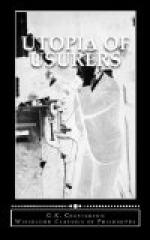Now the ordinary version of recent English history that most moderately educated people have absorbed from childhood is something like this. That we emerged slowly from a semi-barbarism in which all the power and wealth were in the hands of Kings and a few nobles; that the King’s power was broken first and then in due time that of the nobles, that this piece-meal improvement was brought about by one class after another waking up to a sense of citizenship and demanding a place in the national councils, frequently by riot or violence; and that in consequence of such menacing popular action, the franchise was granted to one class after another and used more and more to improve the social conditions of those classes, until we practically became a democracy, save for such exceptions as that of the women. I do not think anyone will deny that something like that is the general idea of the educated man who reads a newspaper and of the newspaper that he reads. That is the view current at public schools and colleges; it is part of the culture of all the classes that count for much in government; and there is not one word of truth in it from beginning to end.
That Great Reform Bill
Wealth and political power were very much more popularly distributed in the Middle Ages than they are now; but we will pass all that and consider recent history. The franchise has never been largely and liberally granted in England; half the males have no vote and are not likely to get one. It was never granted in reply to pressure from awakened sections of the democracy; in every case there was a perfectly clear motive for granting it solely for the convenience of the aristocrats. The Great Reform Bill was not passed in response to such riots as that which destroyed a Castle; nor did the men who destroyed the Castle get any advantage whatever out of the Great Reform Bill. The Great Reform Bill was passed in order to seal an alliance between the landed aristocrats and the rich manufacturers of the north (an alliance that rules us still); and the chief object of that alliance was to prevent the English populace getting any political power in the general excitement after the French Revolution. No one can read Macaulay’s speech on the Chartists, for instance, and not see that this is so. Disraeli’s further extension of the suffrage was not effected by the intellectual vivacity and pure republican theory of the mid-Victorian agricultural labourer; it was effected by a politician who saw an opportunity to dish the Whigs, and guessed that certain orthodoxies in the more prosperous artisan might yet give him a balance against the commercial Radicals. And while this very thin game of wire-pulling with the mere abstraction of the vote was being worked entirely by the oligarchs and entirely in their interests, the solid and real thing that was going on was the steady despoiling of the poor of all power or wealth, until they find themselves to-day upon the threshold of slavery. That is The Working Man’s History of England.




